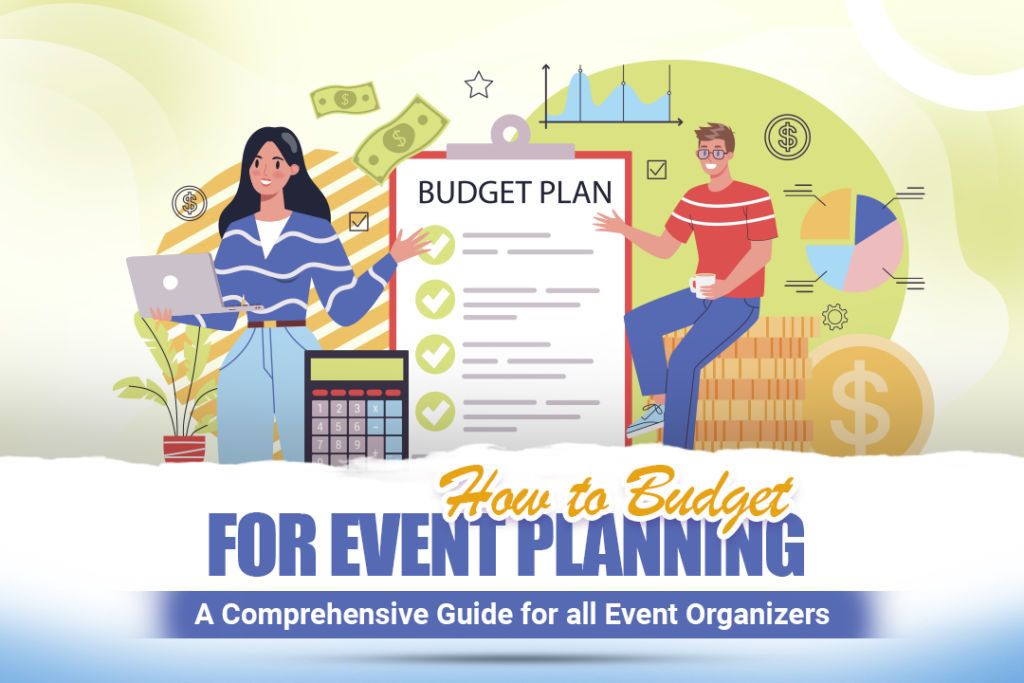
With the rising cost of equipment and service charges, the importance of having a budget for your event has significantly risen. A thoughtful budget can enable you to create an event that achieves its objective and can reduce costs. According to Knowland, increasing event costs is a primary concern for almost 47% of event planners. This number highlights the value of conscious budgeting, which can make or break your event planning.
Learning to budget for event planning is important as it considers all the steps necessary to organize and execute a successful event while determining if your event can achieve its objective. To learn more about event planning strategy, check out our recent blog, ‘The Ultimate Event Strategy Guide for Conference Planners’.
In this blog, we will discuss how to create an event budget that allows you to deliver a memorable experience. So, let’s begin by understanding the event budget in detail.
What Is An Event Budget?
An event budget provides a structural framework for your event planning that helps you efficiently organize and allocate your resources. Your budget will categorize every event element based on its requirements, provide a description, and estimate the cost. It keeps track of your projected expenses and revenue and compares it with the actual costs and income after the event to determine your event’s financial success.

Your realized expenses and revenue might differ from your estimated budget, but having a clear budget will help you determine if your event was profitable.
Planning for an event budget sets realistic expectations for you to achieve and limits overspending on unnecessary aspects. For instance, if your team wants to upgrade to a larger venue with minimum or zero impact on your event, your budget will ensure you make an informed decision.
Why Is Event Budget Planning Important?
Event budget planning is crucial to aligning your event planning efforts with data-driven decisions. It is the solid foundation upon which your event strategies can flourish. As such, let us look at some aspects of event planning that prove event budgets’ varying usage and importance.
Allows Efficient Resource Allocation
Ben Harding, Founder of Fresh Productions, emphasizes creating a comprehensive budget to ensure you allocate resources effectively. “Begin by identifying all expenses, including venue rental, catering, AV equipment, marketing, and staff. Research industry averages to gauge realistic costs,” he says. A clear event budget must provide a framework that outlines every aspect of your event based on its importance. You can track your expenses and revenue more efficiently, allowing better resource management by categorizing every process.

Enables Financial Control Over Your Event
An event budget proactively monitors your expenses and revenue. It prevents you from overspending on unnecessary expenses and keeps you within the financial parameters defined by careful planning. As an event budget planner, this allows you to have more financial control over your event.
Better Risk Management
You might encounter unforeseen expenses or accidental costs even with extensive financial planning. To better mitigate such risks impacting your event budget, you should have a contingency plan where you set aside extra funds for unintentional circumstances. Budget planning should also consider potential pitfalls and worst-case scenarios to better prepare for these events.
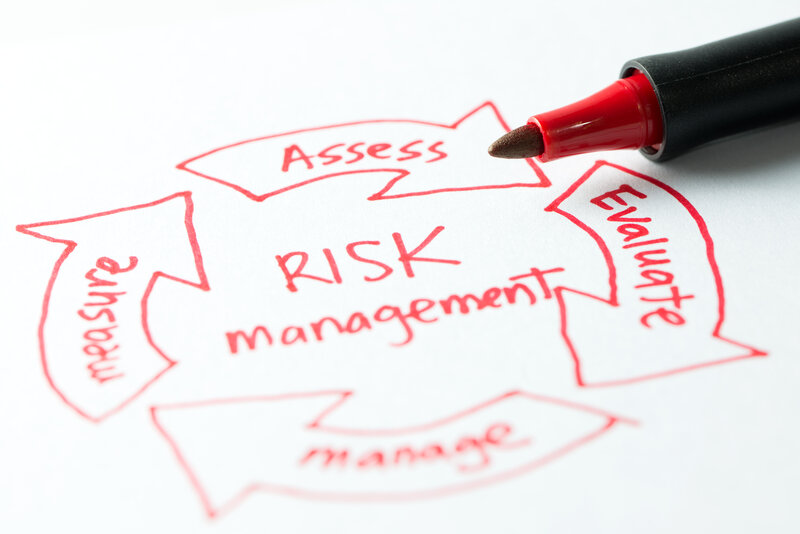
Achieving your Event’s Goals & Objectives
The ultimate purpose of an event budget is to achieve a well-defined objective/goal. By directing your resources into value-generating aspects, you cover all the checkpoints for achieving your event goal. Therefore, a well-planned budget allows you to create a realistic and attainable event goal and a financial roadmap to achieve it with the available resources.
Ensures a Positive Return on Investment (ROI)
You can estimate your event’s financial success with an in-depth income and expense analysis. If your projected revenue exceeds your costs, your event’s investment return is positive. The actual numbers might vary, but you can plan a positive ROI for your event by being realistic and having adequate foresight.

We have understood that a budget is essential for event planning. Now, explore the critical components you must consider before creating a budget.
Things To Consider In Creating An Event Budget
The essence of the event budget is extensive research and planning for every aspect of the event. As an event planner, you must have an exhaustive list of things to consider while planning your event.
A crucial part of an event budget is analyzing what is essential for your event and researching its impact on your finances. You must keep your event goals in mind and move accordingly. You could encounter some critical issues within your event that you must understand before creating a budget for event planning.
Let’s understand some of these critical aspects of an event for your financial budget.
1. Event Purpose and Goals
“Clear and open budget management helps ensure seamless execution and continual success for your events,” said Adin Jacobs, Co-Founder & CEO of Revent, in a recent post. Your event’s purpose and goals guide your event’s planning. Without that, you won’t be having an event. The primary objective of an event budget is to allow your event’s goals to materialize by creating a financial plan with your available resources and turning it into a profitable endeavor.
Your event’s goals and objectives must be clear and attainable. For instance, if your B2B event aims to brainstorm ideas about AI technology, you must organize a conference of IT professionals from different companies. Such clear and attainable goals will help you develop a budget for such a conference.
2. Event Venue, Theme, and Logistics
After determining your event’s purpose and goals, you will search for a better venue and plan a theme that suits those objectives.
According to PCMA Convene research, 33% of all in-person event expenses are allotted towards food and beverage (F&B) alone. These considerations have a tangible impact on your financial budget. For instance, having your event at a luxurious hotel for a sales event would require a considerable budget. Similarly, your event theme and decorations will also affect your budget. These include costs for lighting, decors, logistics, food and beverage, ornaments, carpets, sheets, etc.
Being simultaneously aware of your event’s objective, the type of event required, and your budget will allow for a harmonious event planning process. Any discrepancy in these three variables will, in turn, prove effective.
For example, suppose your event objective is to introduce a new SAAS product, and you select an event venue in a fancy hotel with coffee costing $250 per gallon and a limited financial budget. In that case, the event will be a disaster. Keeping your event’s goals and venue and logistics planning coherent will allow your budget to allocate funds where required.

3. Number of Attendees
Similar to event venue and logistics, planning for the number of attendees for your event is crucial for the event budget.
You must be aware that each attendee has a dedicated budget. Accurate estimation of the number of people attending your event will prevent overspending, food waste, and the waste of valuable seat space.
Each attendee will have their F&B budget, seat, sponsored goodies, ID cards, hotel bookings, and transportation arrangements, all requiring individual budgets. That is why you should have effective methods to ensure the actual number of attendees at your event by sending them reminder emails for your signed-up attendees from your event website, as mentioned in our article, “The Ultimate Event Strategy Guide for Conference Planners.”
4. Current costs of goods and services
To have an adequate event budget, you must consider the current costs of goods and services required for the event. The budget must create an estimated calculation of every aspect related to your event. It should also consider inflation and its impact on changing the actual costs.
In the current scenario, where the prices of goods and services constantly evolve, you need to allow room for flexibility in your financial projections.
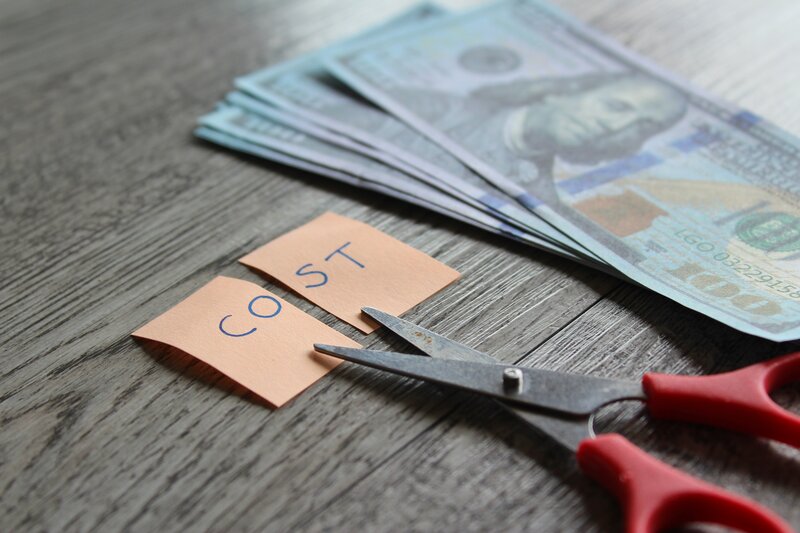
5. Your Revenue Goals
Concurrent with your cost estimation, you should also project your income sources and revenue goals. By defining your revenue goals, you can address ways to compensate for the expenses and eventually get a positive ROI on your event. You must ensure that your revenue goals are realistic and can be achieved with your defined income sources, such as ticket sales, sponsorships, donations, hotel reimbursements, and the like.
6. Marketing Expenses
Event marketing is an essential part of any event; as such, it tends to take a considerable chunk of funds from your event budget. Aligning your marketing efforts with your event’s goals will balance any over-expenses and maintain a consistent tone in your campaigns. Nonetheless, your event budget should allow adequate room for the marketing department, which is crucial to your event’s success.
To learn more about different types of event marketing strategies and understand how to design your event budget accordingly, read our blog, “ A Comprehensive Guide of Event Marketing Strategies That Guarantee Success.”

7. Event Management Software
Event management software is necessary for the smooth management of an event. These tools allow for seamless integration of different variables into one screen, thus providing effective management.
According to USD Analytics, the global event management software business is projected to increase by 12.6% CAGR from $14.2 billion in 2024 to $28.9 billion in 2030. This significant growth underscores the increasing impact of event management software on the event industry.
As such, these tools don’t come cheap. They offer different pricing models that allow you to unlock other features, and some of them charge monthly, quarterly, or annually. A prudent event organizer determines what pricing model or charging cycle is required based on their event’s goal. Blindly subscribing to the Pro plan of a tool, where only the Intermediate plan can do the job, will be an unnecessary expenditure.
8. Attendee Experience
The attendee experience includes everything from good F&B supplies to speakers, entertainment, and more. This is an intangible aspect of your event planning, as no matter how much effort you put into it, you can never get a measurable result. The best you can do is provide your attendees with enough convenience and quality time so that they feel content with your event.
Your event must have good speakers and activities to engage your attendees. Spending money on such experiences is necessary to make your event memorable and boost your organization’s brand value. Therefore, the costs of the attendee experience must be considered in your event budget.
We have covered the essential aspects to consider in the budget for event planning. The next section will discuss how to create your event budget.
How To Create A Budget For Event Planning
After learning about event planning, we will discuss creating an effective event budget.
Step 1: Identify Your Event’s Goals and Objectives
The first step in creating your event budget is identifying and understanding your event’s goals and objectives. “Start with the big picture when planning your event budget; consider major costs such as venue, catering, and entertainment. Break down these costs into detail to accurately estimate expenses and allocate funds effectively. Envision the overall scope and purpose of your event. Define your financial goals and objectives so that you have a clear direction for the budgeting process.” says Alanna Gross, CEO/Creative Director at Event 2 Event, in a recent LinkedIn post.
Creating a budget around your event’s goals or objectives will help you root it in something concrete. Since a financial budget is a framework for achieving a goal, aligning your budget with your event’s goal can help you make it more achievable. A budget without a fixed goal will be in vain, leading to unnecessary and unaccounted expenses.
Moreover, ensure that your event goals are clear and attainable so that the event budget can be developed to achieve them. Refine your goal repeatedly until it becomes a realistic objective worth planning for with a rigorous budget.

Step 2: Create an Event Budget Strategy
The next step for event planners is to create an event budget strategy. In this step, you have to draft an outline to take account of all the elements impacting the event. Since this is a rough draft meant only for the budgeting team, you can brainstorm ideas about what costs or revenue aspects need to be considered. With this draft, you can write down your ideas about how to structure the budget, including/excluding variables and methods of categorizing.
Step 3: Determine Your Event Expenses
The most important part of your event budget is to predict, analyze, record, and compare every expense. As an event organizer, your job is to be aware of the current market condition and estimate costs for successful event execution.
A golden rule of thumb is predicting and recording costs conservatively, assuming the highest number in an approximate estimation. For instance, if the supplier tells you that the audio equipment will cost around $8000 – $17,000, then a conservative estimate would assume it’ll cost $17,000. Predicting a higher number will cover any sudden rise in the prices of goods and services for your event.
A significant part of understanding your event expenses is recording and comparing your estimated and actual costs to determine the profitability of your event. A conservative estimate of fees will help you since you’ve already assumed the highest possible price for every particular.
A conservative estimate will lead to an actual increase in budget for different aspects of your event. Therefore, comparing your projected and actual expenses will show positive numbers because you’ve already accounted for increased prices and adjusted your funds accordingly.
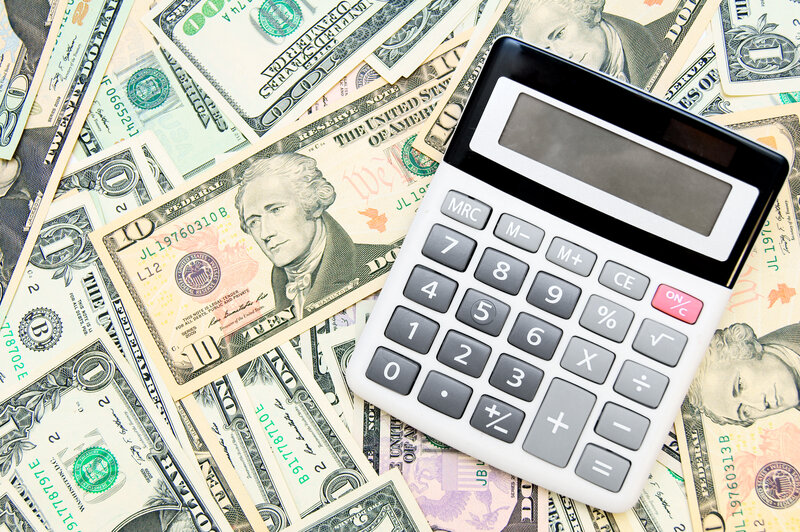
Event organizers should also understand their event’s different types of expenses—fixed, variable, and opportunity costs.
- Fixed costs remain constant and can easily be accounted for, such as those related to food and beverage, venue rental, travel, decor, marketing, etc.
- Variable costs, such as personnel salaries, catering expenses, utilities, office supplies, promotion materials, etc., constantly fluctuate with the type/nature of your event.
- Opportunity cost is an intangible expense that refers to the potential value you miss out on when choosing one alternative over another. For instance, by choosing to spend on a venue for your event, you are ignoring the value you could’ve gotten from investing in digital marketing for the event. In this case, your opportunity cost is the revenue generated from digital marketing.
Event expenses are also dependent on the type of event, and these will have varying impacts on the budget.
- In-person events will demand more venue, logistics, F&B, and equipment funds.
- Virtual events have different cost elements, such as designing virtual event spaces, streaming services, web hosting services, etc., which require a different event budget strategy.
- Hybrid events would combine cost elements from in-person and virtual events. This kind of event would require two audio/visual equipment for two modes of hosting.
Simply put, the estimation of expenses will always differ from the actual costs, along with changing dynamics based on the event’s nature. However, an astute budget will minimize the margin of error, making it an effective financial strategy for your event.
Additionally, you must also create a contingency fund for any unforeseen circumstances. Accounting for such extra expenses will mean that you are already allocating specific funds for such situations and will not require out-of-pocket expenses at that time, thus making your budget fool-proof.
Step 4: Define Your Revenue Streams
As an event organizer, you must consider multiple income sources to cover the event’s expenses. A prudent event budget will always seek various revenue streams that are more than sufficient.
As Victoria Barybin, Co-founder & Vice President at 1987 Masters Inc., points out, “Relying solely on ticket sales or sponsorships will eventually lead to failure. Exploring innovative ways to generate revenue is much more promising: virtual event offerings, merchandising, event-adjacent services, etc. Additionally, diversified portfolios can help mitigate risk and provide financial stability.”.
This means that you, as an event planner, should explore different revenue streams and diversify your portfolio by not being dependent solely on a single source of revenue.
Similar to event expenses, revenue streams can be divided into segments like direct and indirect revenue streams.
Direct revenues are easily calculable and include money made directly from the event, like ticket sales, registration fees, sponsorship packages, onsite product sales, hotel commissions, advertising revenues, donations, and government grants.
Indirect revenue is not calculated in monetary terms. These include goodwill and good audience experience that will serve you well in the future. Moreover, you should always group your income sources into categories relevant to your event, like income from ‘venues,’ ‘sponsorships,’ ‘publicity,’ etc.
Step 5: Calculate Cash Flow For Your Event
You have your event expense and revenue projections. Now, it’s time to calculate your event’s cash flow. You can do that by simply adding all your revenue and then deducting your related expenses. If the number is positive, you have a positive cash flow, or vice versa.
To get a more nuanced cash flow in your event budget, you must account for cash in hand before and after expenses. This can be done by adding all your available funds and subtracting by uncollected accounts receivables, which are money you are owed for your services. The result is your cash in hand before expenses.
Similarly, if you further deduce your accounts payable and the money you owe for the services provided to you from the previous number, you get cash on hand after expenses. A positive number will mean a positive cash flow.
You can further divide your cash flow calculation into two groups: projected number and actual number. A projected cash flow calculation will account for your estimated revenue sources and subtract them from your estimated event expenses. The result will tell you if your estimated budget is profitable or not. The exact process can be applied to the actual cost and revenue calculation to get the same result. It is crucial to have an estimated calculation of profit/loss for your event in the budget to know if your planned expenses or revenue streams need to be adjusted to make the event profitable.

Step 6: Create an Event Budget Sheet & Proposal
The next step for event planners is to create an event budget sheet to store all their financial plans.
Make a comprehensive spreadsheet of all the variables for your event, outlining all the expenses, income sources, and financial calculations. Ensure that the sheet is neat and easily understandable by multiple teams. This will be the economic blueprint for your event, used as a reference to procure, order, and run different expense orders related to your event. Your event budget sheet will be the place where you record your projected and actual expenses and revenue.
Furthermore, you should also design an event budget proposal, a document, or a presentation to convince stakeholders, teams, and your organization to approve your drafted event budget.
As an event planner, your job is to craft the event budget with all the financial elements from estimation to actual variables and the primary fund for the event. However, the authority to sign off, change, or reject the budget rests in those funding the event. An event budget proposal is, therefore, a proposal for your bosses that showcases every element of your event. The proposal should avoid using unnecessary financial jargon and instead focus on the essence of the budget to make it understandable for the stakeholders.
Additionally, your event budget proposal should also include the following elements:
- Your event’s purpose and goals
- Data about past events you hosted
- Competitor analysis of similar events
- Contingency plans in your budget
- Your definition and calculation of the event’s ROI and measurement
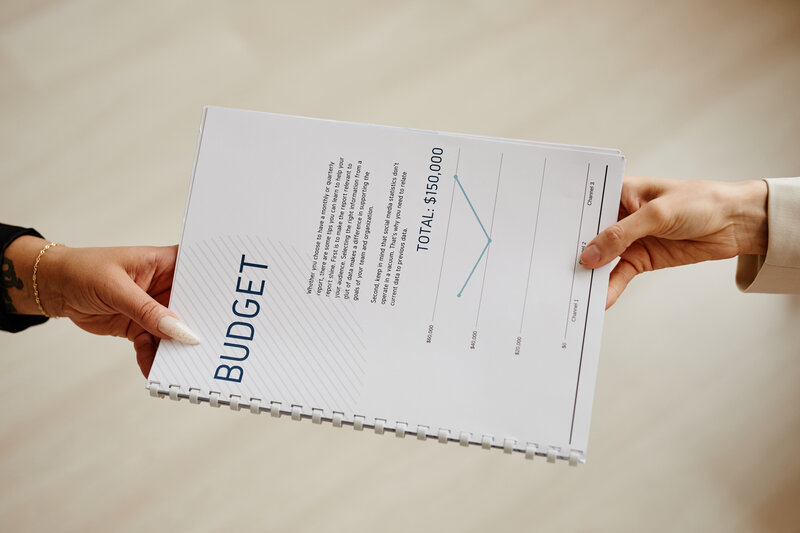
Step 7: Review and Track Your Budget
It is essential to track your budget as the event progresses. One way to review and track your budget in real-time is to use tools that automatically update the database when there’s any expense or income related to the event. The software can be customized to group every expense or income into different categories for your convenience. You can also create a separate category for any money owed to or by you and note it for future reference. This will help maintain a rigorous record of every financial element in your event budget.
Another way to review or track your event budget is to schedule weekly meetings with all the stakeholders and the finance team to discuss every expense or income for that week and plan the agenda for the coming week. Alex Adkins, Founder & Head of Events at Planwell, says, “Generating revenue — is so challenging because it’s not something you can track alone; it takes close partnership with sales and ops to figure out reporting and attribution that makes sense. ”
Similarly, you should collaborate with the finance, sales, marketing, and operations teams to accurately report each department’s actual costs and revenue. Finally, your budget must be synced with a cloud-based server linked to the organization to store your data safely.
Step 8: Measure Your Budget’s Success
The final step in creating your budget for event planning is to measure your budget’s ability to deliver an event without any financial hindrances while making it profitable. But how do you measure if your event budget was profitable or not? To do that, you need to develop measuring criteria against which your budget would be measured. One such measure is the return on investment (ROI), which indicates the monetary value you get from your investment, in this case, the event.
A positive ROI means that your event budget has delivered more revenue than expenses, thus making your event profitable. Another way to look at this is that if your actual income from the event is greater than the actual expenditure, you will have a surplus balance in your budget, indicating a profitable event.

Key Takeaway
Creating an adequate budget is the key to your overall event’s success. A flexible budget that can manage changing circumstances while being robust enough to provide a structural framework is essential to pulling off a profitable event. There are many events with good ideas and flashy venues. Still, it will be challenging to break even without an adequate event budget to guide your expenses and identify your income sources.
An event organizer must understand how others budget for their events. Eventible can help you by providing a treasure trove of information on various events in multiple industries like Marketing, IT, Finance, HR, and more. Eventible also has user reviews on these events that showcase the real-life experience of the attendees. This can help you plan your next event by giving special consideration to the budget required for organizing it. You can avoid the potential pitfalls by adopting the aforementioned valuable strategies.



Comments are closed.